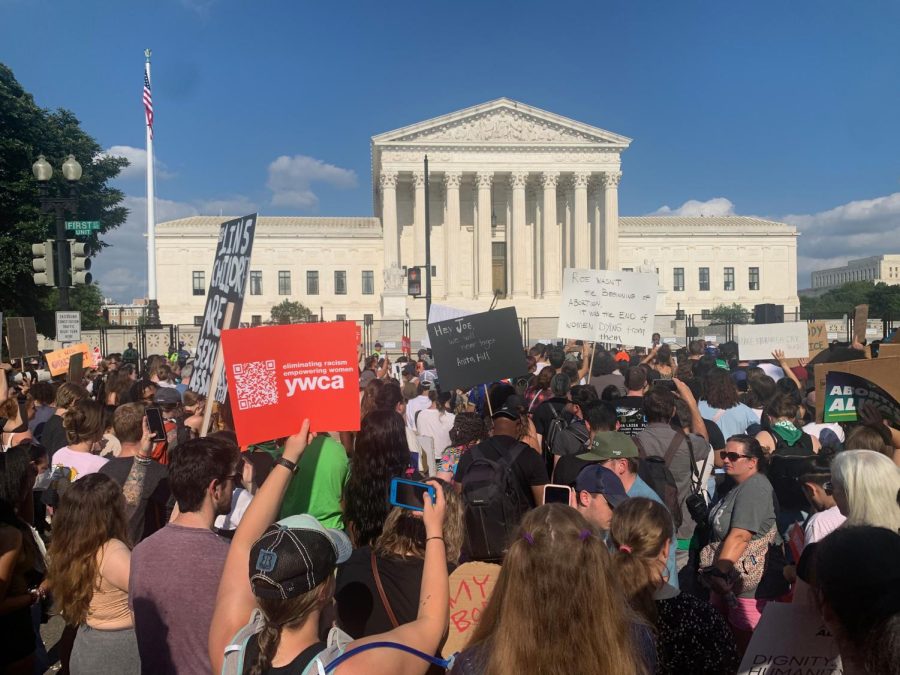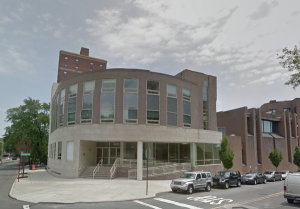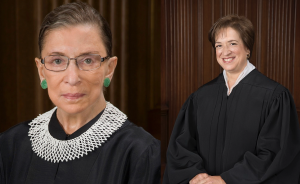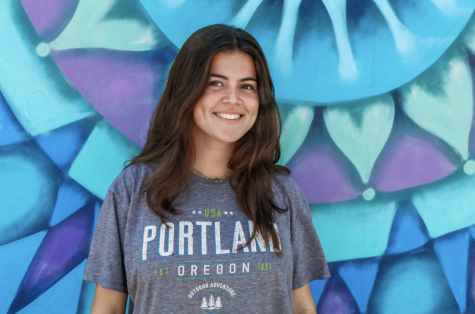Post Roe, states’ laws may say no when halacha says yes
Recent Dobbs decision shows Judaism’s emphasis on mother’s life when deciding whether to terminate a pregnancy
PROTEST: Hundreds of protesters gathered in front of the Supreme Court in Washington, D.C., on June 24, the day when Roe v. Wade was overturned.
January 1, 2023
Rabbi Abraham Lieberman, Shalhevet rabbi and teacher, says terminating a pregnancy violates Judaism’s prohibition against murder, lo tirzach.
“The fetus is a life – if you abort it, you kill it,” Rabbi Lieberman said in an interview with Boiling Point shortly after Roe v Wade was overturned.
“But,” he continued, “the exceptions are extremely large and vary on many levels, with a multiplicity of views.”
In fact, a wide range of interpretations consider abortion under some circumstances not only acceptable but required.
Orthodox experts surveyed by the Boiling Point – including Rabbi Lieberman – agreed that Jewish law, or halacha, on reproductive rights is deeply nuanced, granting many exceptions and depending on myriad details, to its basic prohibition of the procedure.
“Judaism takes into account the importance of life – the viability of life, the mother’s health, and how far the pregnancy has developed,” said Rabbi Lieberman.
Ms. Daphne Lazar Price, executive director of the Jewish Orthodox Feminist Alliance (JOFA), expressed a similar view. JOFA is a non-profit organization focused on protecting and expanding the rights of Jewish women.
“When it comes to Jewish law, which is about the protection of life,” Ms. Lazar Price said in an interview with the Boiling Point last month, “the life of the mother comes before the potential life of the fetus. Life and well-being of the mother always come first.”
That puts Jewish law in opposition to legislation in many American states, newly empowered by last summer’s Supreme Court decision in Dobbs v. Jackson Women’s Health Organization which overturned the 1970 Roe v. Wade decision. The Dobbs decision, announced June 24, ended federal protection of abortion and instead granted states jurisdiction over reproductive rights.
Yoetzet Halacha Atara Segal, former Shalhevet Talmud teacher, said that in those states, the law now prohibits medical intervention even when Jewish law mandates it.
A Yoetzet Halacha is a trained and certified female halachic advisor who specializes in matters pertaining to women, reproduction and intimacy.
“There will be cases where abortion is halachically allowed, or even mandated, and now there are certain states that won’t permit them,” said Yoetzet Segal, who made aliyah in August 2020 and now works in Shalhevet’s Israel Guidance department.
Judaism always prioritizes human life, Yoetzet Segal said, but it doesn’t value all forms of life equally. For example, she said, the Talmud says a fetus is not a nefesh — a person or soul — until the majority of its body exited the womb, so the mother’s life takes priority.
American laws that restrict abortion based on a belief that life begins at conception are thus hindering Jewish religious freedom, she said.
JOFA agrees, and spoke out against the Dobbs decision on religious grounds. It also acted to increase abortion access for women in states that now forbid it.
“We decided that we needed to create an initiative to support women’s bodily autonomy,” said Ms. Lazar Price. “A woman should have the right to make her own decisions about religious and medical matters, including abortion, free from stigma and government interference while retaining human dignity.”
In September, JOFA launched the Rivka Isaacs Support, Advocacy, Funding, Education (SAFE) Plan to increase abortion access for Jewish women and will help all who seek support, no questions asked.
Named after JOFA board member Paula Eiselt’s great-grandmother whose nearly fatal “back-alley” abortion motivates their work, the SAFE Plan refers women to organizations that facilitate abortions and provide financial support.
JOFA shares educational resources about halachic abortions for clergy and the broader Jewish community.
“It’s also about creating a network of people to support women who need access to medical services, including pregnancy termination,” said Ms. Lazar Price.
Since the Supreme Court decision in June, 14 states have tightened restrictions on abortion. Eleven of them had “trigger bans,” or legislation prohibiting abortion passed in previous years designed to take effect immediately if Roe v. Wade was overturned. In many other states, the legislative dispute over abortion continues.
But six other states acted to increase legal protections for pregnancy termination. On Nov. 8, California voters passed Proposition 1, specifically recognizing reproductive freedom under the state’s Constitution.
Although abortion – until 24 weeks under any circumstance, or later at the discretion of a licensed physician – is already legal in California, Prop. 1 amends the California Constitution to “expressly include existing rights to reproductive freedom,” including access to both abortion and contraception.
According to the Los Angeles Times, more than two-thirds of California voters voted yes on Prop. 1. A constitutional amendment needs 50%-plus-one to pass.
For Californians, that puts the decision about terminating a pregnancy back where JOFA, Rabbi Lieberman, Yoetzet Segal and perhaps Judaism itself say it belongs – in the hands of women and their medical, religious or personal advisers.
In halacha, Yoetzet Segal said, there are varying tiers of prohibition that inform the permitted exceptions.
The most lenient approach focuses on the fact that until 40 days after conception, the Talmud says a fetus is considered merely water, Yoetzet Segal said.
This distinction was also noted by Rabbi Lieberman.
“Because of that idea, many times there are greater leniencies about abortion within the 40 days,” said Rabbi Lieberman. “After the 40 days, they become more concrete.”
A slightly stricter approach takes into account the discrepancy between the Talmud’s punishment for killing a fetus versus another human being. Yoetzet Segal said that those who follow this interpretation will likely allow abortions taking into account the mother’s and fetus’s quality of life. These cases include severe birth defects in the fetus or maternal cancer that requires radiation treatment that may prolong her life (and which would damage the fetus, thus requiring an abortion).
Stricter interpretations, she said, might only permit abortion if the mother’s life is at risk – for example, in cases of dangerously elevated blood pressure or maternal cancer that requires radiation treatment (only if it is guaranteed to save the mother).
For example, Agudath Israel of America, which represents more conservative streams of Orthodoxy, supported the Dobbs decision. It said that Judaism deeply values the life of the fetus, and that exceptions to the abortion prohibition are so “extraordinary” and “rare” that they welcomed the overturning of Roe v. Wade.
“We do not seek to impose our religious beliefs on the broader American society,” said in a statement on the organization’s website. “However, society, through its laws, should promote a social ethic that affirms the supreme value of life.”
It is unclear – in any of these interpretations – whether or not the mental health of the mother who wants an abortion qualifies as posing a risk to her health, thereby permitting her to attain an abortion.
Rabbi Lieberman says that although he isn’t a mental health professional, he believes that the mental health of a mother should be taken into account as a factor that impairs her overall health.
“If you are not mentally well, how can you raise a child?” Rabbi Lieberman asked. “We know how important mental health is today, more than ever before.”
Shalhevet school counselor Ms. Gabriela Marcus said that the overturning of Roe v. Wade could have a detrimental effect on women, calling the decision a “traumatic day” for many women who may now suffer psychologically.
“Having agency taken from them in some way – meaning the agency to your own body or making choices about your own body – is harmful,” said Ms. Marcus, who also teaches the SAS psychology class. “It makes you feel like you don’t have self-determination, like you aren’t important, like you aren’t even a person.”
She also said, however, that getting an abortion is a serious decision that itself will likely impact a mother psychologically, and therefore should not be taken lightly.
Ms. Marcus said she’d like to think that mental health would be a reason for a woman to get an abortion, but she doesn’t know where the line is drawn. She believes it should be up to the discretion of a halachic authority on a case-by-case basis.
Advances in technology are likely to create a need for continued rabbinic decision-making.
Rabbinic authorities are constantly grappling with new questions that arise as technology becomes more advanced. For example, Rabbi Lieberman says that a current machloket – is whether or not abortion is permitted if pre-natal scans show birth defects or health issues in a fetus.
Most importantly, he said, Jews must turn to traditional text when confronted with contemporary conflicts – the possibility of terminating pregnancies being an example.
“Every political issue has to be resolved through the prism of halacha and Torah,” Rabbi Lieberman said.
When Jews approach decisions through a halachic lens, he said, they abide by Judaism’s moral code. That, he said, also enables Jews to model morality for others in a different way from secular law.
“Judaism, which accounts for all those leniencies, does not enforce its point of view on the world,” Rabbi Lieberman said. “Instead, it will be a light on the nations and teach you about morality.”


















